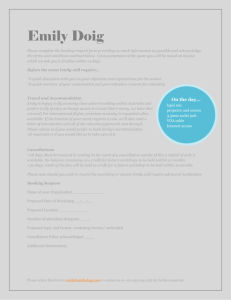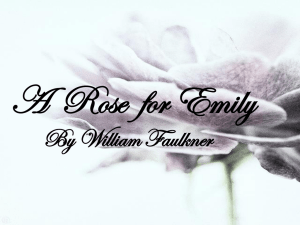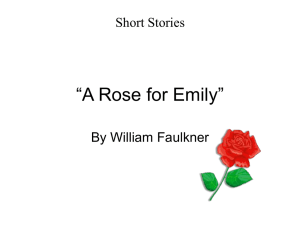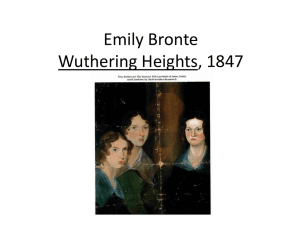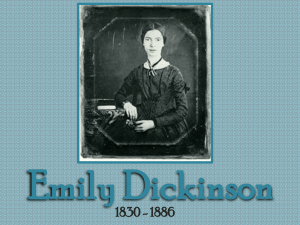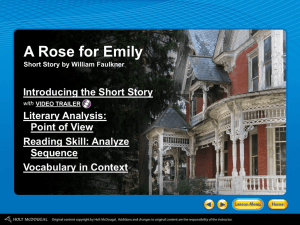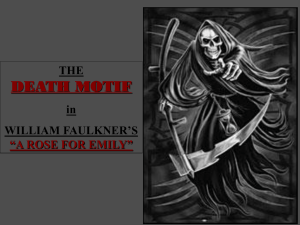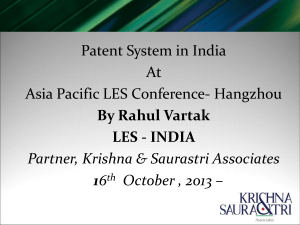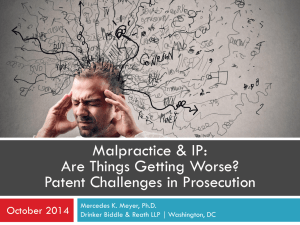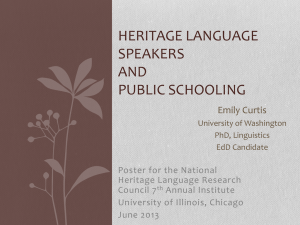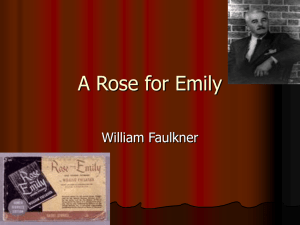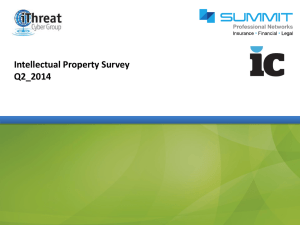CS415-030411legal - Rose
advertisement
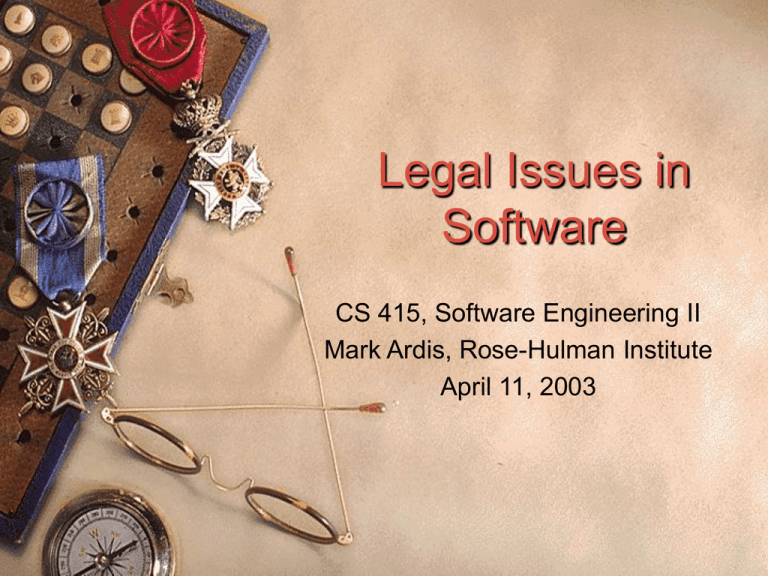
Legal Issues in Software CS 415, Software Engineering II Mark Ardis, Rose-Hulman Institute April 11, 2003 DISCLAIMERS I am not a lawyer. Nothing in this lecture should be considered legal advice. The contents of this lecture are for educational purposes only. 2 "The first thing we do, let's kill all the lawyers." -- Shakespeare, King Henry VI, Pt. IV, ii, 86 "The more I see of lawyers, the more I despise them." -- Mark Twain, letter to James R. Osgood, Jan.25, 1876 3 Outline Lawsuits Intellectual property 4 Lawsuits Negligence Malpractice 5 Negligence You have a duty to exercise reasonable care in providing services. You are negligent if no reasonable person in your situation would have acted as you did. Penalties may be limited by contract. 6 Malpractice You have a duty to use the standard and accepted practices of your profession. You are guilty of malpractice if no reasonable person of your profession would have acted as you did. Penalties are not limited by contract, may include treble damages. 7 Requirements for a Profession 1. 2. 3. 4. 5. extensive learning and training code of ethics disciplinary system for members emphasis on social responsibility license 8 Negligence vs. Malpractice Negligence – use reasonable care – guilty if no reasonable person would have acted as you did – penalties may be limited by contract Malpractice – use standard and accepted practices of your profession – guilty if no reasonable person of your profession would have acted as you did – penalties are not limited by contract, may include treble damages 9 Cartoon of the Day 10 Intellectual Property Case Study Introduction Patents Copyright Trade Secrets Open source Case Study Discussion 11 Case Study (adapted from Intellectual Property Protection for Software Curriculum Module SEI-CM-14-2.1, by Pamela Samuelson and Kevin Deasey, July 1989) 12 Background Emily is an undergraduate student in software engineering at Module University. Emily has recently written a highly original and useful computer program for accounting functions used in small professional operations. Emily wrote the program to fulfill requirements of a course. 13 Copyright Case Study Can Emily claim a copyright on the software? Can another student reuse part or all of Emily's program? Can another student reuse Emily's highlevel or detailed design? 14 Patent Case Study Can Emily obtain a patent on the software? If she obtains a patent, can she also copyright the software? What if she wrote the software as part of a summer job for the university? 15 Intellectual Property Case Study Introduction Patents Copyright Trade Secrets Open source Case Study Discussion 16 Patents Used for processes, machines, manufactures Subject must be new, unobvious and useful Grants owner exclusive right to make, use and sell for 17 years Companies are entitled to patents on "work for hire" by employees 17 Copyright Used for any writing or creation Subject must have been created by copyright owner Grants owner (and heirs) exclusive right to copy, distribute, make derivative works until 70 years after death of owner Companies are entitled to copyrights on 18 "work for hire" by employees Copyright Limitations -- Fair Use 1. 2. 3. 4. the purpose and character of the use, including whether such use is of a commercial nature or is for nonprofit educational purposes the nature of the copyrighted work the amount and substantiality of the portion used in relation to the copyrighted work as a whole the effect of the use upon the potential market for or value of the copyrighted work 19 Digital Millennium Copyright Act (DMCA) Passed by congress and signed into law in 1998. Prevents circumvention of Technological Protection Measures (TPMs) Extends copyright protection 20 years 20 Trade Secrets Used for formulas, patterns, devices Subject must be used for competitive advantage in business, and must be maintained as secret Grants owner exclusive right to enforce protection against fraud for as long as subject is secret 21 Open Source Free software ("free" as in "free speech", not as in "free beer") Copyleft protects creator from having work stolen, obligates copiers to allow further copying Open source movement leverages many like-minded developers through loose cooperation 22 Intellectual Property Case Study Introduction Patents Copyright Trade Secrets Open source Case Study Discussion 23 Case Study Discussion 1. 2. 3. 4. Divide up into groups of 4 or 5 Discuss your answers to the questions Fill in your personal answers on the quiz After I collect the quizzes, we will discuss the conclusions from each group 24 Copyright Case Study Can Emily claim a copyright on the software? Can another student reuse part or all of Emily's program? Can another student reuse Emily's highlevel or detailed design? 25 Patent Case Study Can Emily obtain a patent on the software? If she obtains a patent, can she also copyright the software? What if she wrote the software as part of a summer job for the university? 26
